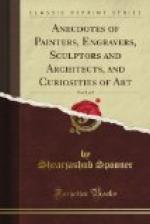“Students of all nations fixed themselves round the principal pictures, anxious to complete their copies before the workmen came to remove the originals. Many young French girls were seen among these, perched upon small scaffolds, and calmly pursuing their labors in the midst of the throng and bustle. When the French gallery was thoroughly cleared of the property of other nations, I reckoned the number of pictures which then remained to it, and found that the total left to the French nation, of the fifteen hundred pictures which constituted their magnificent collection, was two hundred and seventy-four! The Italian division comprehended about eighty-five specimens; these were now dwindled to twelve: in this small number, however, there are some very exquisite pictures by Raffaelle, and other great masters. Their Titians are much reduced, but they keep the Entombment, as belonging to the King of France’s old collection, which is one of the finest by that artist. A melancholy air of utter ruin mantled over the walls of this superb gallery: the floor was covered with empty frames: a Frenchman, in the midst of his sorrow, had his joke, in saying, ’Well, we should not have left to them even these!’ In walking down this exhausted place, I observed a person, wearing the insignia of the legion of honor, suddenly stop short, and heard him exclaim, ’Ah, my God—and the Paul Potter, too!’ This referred to the famous painting of a bull by that master, which is the largest of his pictures, and is very highly valued. It belonged to the Netherlands, and has been returned to them. It was said that the emperor Alexander offered fifteen thousand pounds for it.
“The removal of the statues was later in commencing, and took up more time; they were still packing these up when I quitted Paris. I saw the Venus, the Apollo, and the Laocooen removed: these may be deemed the presiding deities of the collection. The solemn antique look of these halls fled forever, when the workmen came in with their straw and Plaster of Paris, to pack up. The French could not, for some time, allow themselves to believe that their enemies would dare to deprive them of these sacred works; it appeared to them impossible that they should be separated from France—from la France—the country of the Louvre and the Institute; it seemed a contingency beyond the limits of human reverses. But it happened, nevertheless: they were all removed. One afternoon, before quitting the place, I accidentally




